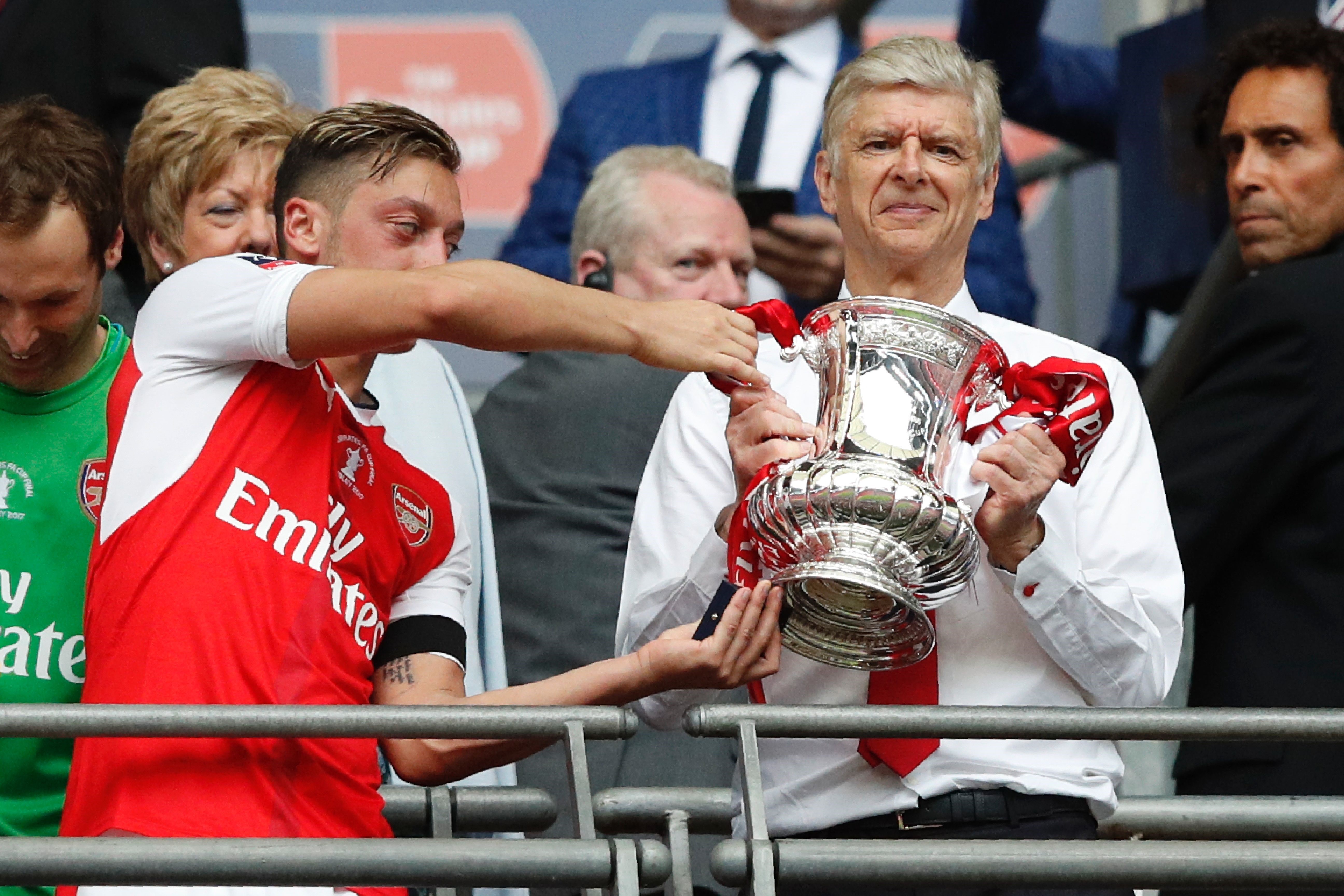Mesut Ozil made Arsenal win again - and nobody should forget that as he moves to Fenerbahce
/dnl.eurosport.com/sd/img/placeholder/eurosport_logo_1x1.png)
Updated 24/01/2021 at 14:47 GMT
Mesut Ozil's Arsenal career may not have coincided with the club's most successful years in the Premier League, but he helped a club deprived of trophies win silverware once more, showed a large amount of loyalty and paved the way for more expensive signings. Following his move to Fenerbahce, his Emirates Stadium career deserves more credit than it is given.
Arsenal's Mesut Ozil celebrates after the FA Cup Final between Aston Villa and Arsenal at Wembley Stadium on May 30, 2015 in London, England.
Image credit: Getty Images
The day Mesut Ozil arrived was about as good as it could get for an Arsenal fan. After a stagnant summer of non-activity in the transfer market, on a sunny August day, free-spending Tottenham visited the Emirates and were hotly backed to win. They did not, with Olivier Giroud scoring, and things got better for the red half of north London from there.
Within hours of full-time, it was confirmed that Gareth Bale, often the thorn in Arsenal's side would be leaving Spurs for Real Madrid. Better still, someone had to vacate a spot in the Real Madrid squad for him and Arsene Wenger was primed to swoop for the marquee signing for which fans had clamoured for so long. Enter Mesut Ozil. Wenger's wry smile in his post-match interview remains the stuff of memes.
The euphoria was cathartic. Arsenal had spent years in self-imposed austerity to pay off their move from Highbury to the Emirates. A gradual decline followed, with the likes of Samir Nasri and Robin van Persie losing patience with the project and leaving to win trophies elsewhere. The Invincibles became a mere memory and the movement to depose Wenger was becoming stronger as the trophy drought stretched to eight years. The opening day 3-1 loss at home to Aston Villa was greeted with chants of "Spending some f***ing money".
Suddenly, finally, the most fiscally prudent manager in the game was ready to splash the cash and bring a bona fide world-class player to the club. In previous years, the likes of Cristiano Ronaldo, Cesc Fabregas, Bale, and even Thierry Henry made their names in England before moving to Spain. And here was a winner of La Liga, a star of the previous World Cup, coming to the Premier League at the age of 24 to spend his best years there.
/origin-imgresizer.eurosport.com/2020/10/06/2908809-59789188-2560-1440.png)
Mesut Ozil offers to pay Gunnersaurus' wages
With Ozil's arrival, Arsenal were back in the groove. Within minutes of his debut he registered his first assist in a 3-1 away at Sunderland with a fine pass to Olivier Giroud. Within weeks, Arsenal were top of the league, holding on to top spot for all but one matchday between September and March.
Their title challenge wilted but the FA Cup still presented an opportunity to end the trophy drought. Mesut Ozil was hardly the man of the match in the 3-2 comeback win in the final against Hull, who were not tough opposition, but Arsenal's previous final was against Birmingham City and they had lost it. A season that had begun in farce, had ended in ecstasy and it was clear what the turning point was.
In many ways, Ozil's early years at Arsenal were a series of what ifs. Had he not been ruled out for three months in 2014-15, the 12-point gap which separated them in third and Chelsea in top spot would surely have been significantly smaller. Dropped points against Southampton, Stoke City, Hull City and Swansea City certainly hint at that. If his team-mates had played as well as him in 2015-16, when he registered 19 assists, they would surely have finished above Leicester and finally won the title. It is almost certain that one of Wenger's greatest regrets was only signing a goalkeeper prior to that campaign.
Some of Arsenal's failings in that time were blamed on Ozil, somewhat unfairly. His laconic nature on the ball earned him accusations of indifference to the team cause. By contrast, Alexis Sanchez, signed a year after him, was often seen hurtling around the pitch to chase a lost cause. He was generally singled out as a reason for Arsenal's poor results in away games against their rivals. And while it was obvious that losing both Sanchez and Ozil would have been fatal in January 2018, many questioned the logic in giving him a contract worth £350,000 a week.

Almost eight years on from that sunny day in August 2013 and Ozil is leaving Arsenal under a cloud. Undroppable under Wenger but out of the picture under Unai Emery, he was ostracised all together by Mikel Arteta after a brief renaissance. He has not played a minute of competitive football since March, when he set up a late winner for Alex Lacazette against West Ham, and his later years in London have become a soap opera, both in his dealings on the pitch and off it.
The events after the 2018 World Cup, where he dramatically retired from international football citing racial discrimination, made him the centre of attention for a desperately sad reason. The summer of 2019 saw two armed men attempt to carjack him and Arsenal team-mate Sead Kolasinac at knife point and both were forced to sit out several games over fears for their safety. He was in a seemingly endless cycle of both self-imposed and inadvertent controversy, from his posing with the despotic Turkish president Recep Tayyip Erdogan to his vocal support for the oppressed Uighur people in China, which earned him a rebuke from a club eager to protect commercial interests in the far east.
And since his ostracisation from the first team, he has run a nakedly obvious social media campaign to mobilise his fans and foment disquiet, live-tweeting matches and making public criticism of the club's tough decision to part with staff after the Covid-19 pandemic forced fans from stadia. That he refused a pay-cut himself when the crisis struck, bucking the trend of his team-mates, reflected very poorly on him.
The creative genius' reputation now is less Dennis Bergkamp and more Winston Bogarde. But it is grossly unfair. He joined a club seemingly in terminal decline and made them competitive once more, playing a key role in their two sole title challenges since 2007-08. When he arrived, Arsenal were without silverware for almost a decade and they have since won four FA Cups. He was particularly impressive in the 2017 final against Chelsea.

His seven-and-a-half years of service is more time than some legends spent with the club, outstripping the likes of Robert Pires and Gilberto Silva and falling just short of Thierry Henry. He could easily have quit when Champions League football was no longer on Arsenal's agenda and he was 28, but he stuck with them and played in the Europa League.
Rather than the sorry ending he has endured, Arsenal fans should remember the good times. The jubilation at his signing and the flashes of his genius - his demolition of Manchester United in October 2015, the special last-gasp winner against Ludogorets, some awe-inspiring passes and assists, his magical performance against Leicester in 2018 and his extraordinary highlight reel of chipped goals.
His signing heralded a new era. He brought a winning pedigree to a team devoid of success and paved the way for other big-name signings such as Sanchez, Lacazette and Pierre-Emerick Aubameyang. Arsenal may have slipped from second in the league in 2016 to eighth in 2020, but they reached a final in all but one of his seasons at the club, having reached just one in the six years prior to it. He is the most decorated player of the Emirates era, and unlikely to be usurped in the immediate future.
It is a real shame that a fine Arsenal career has ended this way. The one solace is that his final action in an Arsenal shirt was the same as his first - setting up a French striker for a goal.
Scan me
Related Topics
Share this article
Advertisement
Advertisement